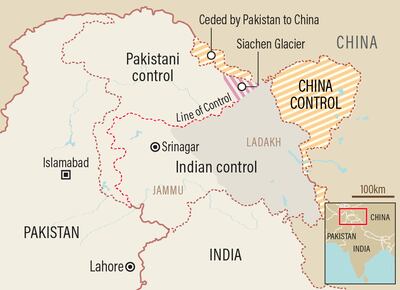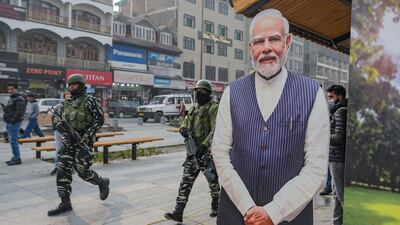India’s top court has upheld a 2019 decision by Prime Minister Narendra Modi's government to scrap seven decades of autonomy in Kashmir, the country’s only Muslim-majority region.
The verdict is expected to give the ruling party a boost ahead of general elections next year.
The ruling, delivered on Monday by a five-judge bench of the Supreme Court headed by Chief Justice D Y Chandrachud, said the former state of Jammu and Kashmir did not retain sovereignty when it joined India and that the abrogation of Article 370 of the constitution, which gave the region special status, was valid.
The court also ordered elections to be held in the region by September next year.
Mr Modi's government revoked the special status of Jammu and Kashmir in a surprise move in August 2019 and split the Himalayan region of 12 million people into two federally controlled territories.

The right to own land and take up government jobs in Kashmir, which was reserved for residents of the state, was opened up to all citizens of India.
The Supreme Court said the special status of Jammu and Kashmir was a temporary constitutional provision and could be revoked. It also ordered that the region's statehood should be restored at the earliest.
“Article 370 was an interim arrangement due to war conditions in the state,” Chief Justice Chandrachud said, referring to the first India-Pakistan war over the region.
Mr Modi and leaders of his Hindu nationalist Bharatiya Janata Party, which has long opposed any special treatment for Kashmir, welcomed the court's verdict. “The verdict today is not just a legal judgment; it is a beacon of hope, a promise of a brighter future and a testament to our collective resolve to build a stronger, more united India,’’ Mr Modi said on X, formerly known as Twitter.
“I want to assure the resilient people of Jammu, Kashmir and Ladakh that our commitment to fulfilling your dreams remains unwavering. We are determined to ensure that the fruits of progress not only reach you but also extend their benefits to the most vulnerable and marginalised sections of our society who suffered due to Article 370.”
However, politicians from the region expressed disappointment. “Disappointed but not disheartened,” Omar Abdullah, a leader of the Jammu and Kashmir National Conference Party and a former chief minister of the state.
“The struggle will continue,” Mr Abdullah wrote. “It took the BJP decades to reach here. We are also prepared for the long haul.”
His views were echoed by Mehbooba Mufti, another former chief minister and president of the Jammu and Kashmir People's Democratic Party.
“The people of J & are not going to lose hope or give up. Our fight for honour and dignity will continue regardless. This isn’t the end of the road for us,” she posted on X.
Mr Modi's government says investments to Kashmir have started following a revival of infrastructure and tourism in the region since 2019.
Control of Kashmir has been divided between India and Pakistan since both countries attained independence from Britain in 1947. Both countries claim it as their own and have fought two of their three wars over the territory. The region was wracked for many years by an armed insurgency by groups seeking either union with Pakistan or independence from both countries.
Authorities increased security in the area before the Supreme Court's verdict.
After Kashmir's special status was revoked, people’s movements were restricted, telephone lines were cut, internet connectivity was restricted and local political leaders were arrested.
The BJP has been using the Kashmir issue to bolster its narrative that the Modi government is prioritising national security and curbing terrorism.
The court's decision is likely to boost the BJP's electoral prospects outside the region, said Satish Misra, a New Delhi-based independent political analyst.
“It will not give much advantage to the BJP in the elections in Jammu and Kashmir as people there are not happy with the development,’’ Mr Misra told The National.
“But at the national level, it will strengthen its image, as BJP leaders will highlight to their Hindu supporters that the party has fulfilled its long-made promise.’’

